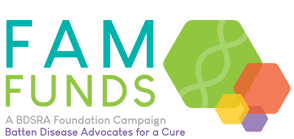
For Immediate Release
For More Information Contact: Leslie Fulford
Leslie@TeamFleisher.com
614-354-0720
Batten Disease Support and Research Association Awards 2016 Research Grants
Nine outstanding research facilities receive funding to further investigation into the deadly disease
Columbus, Ohio (Sept. 20, 2016) — The Batten Disease Support and Research Association (BDSRA) is pleased to announce its 2016 research grant awardees. BDSRA- Australia, Drew’s Hope, Noah’s Hope-Hope4Bridget, Beyond Batten Disease Foundation, and the Thisbe and Noah Scott Foundation have partnered with BDSRA to co-fund these important projects
The BDSRA merit review cycle begins in November of each year. Interested researchers are invited to submit a letter of intent (LOI) outlining the research they want to conduct. Those candidates receiving the highest scores are asked to offer full proposals, which are then reviewed by a panel of three scientists. The top proposals are forwarded to the BDSRA board for approval and funding.
This year’s awardees include:
- Rebecca Whiting, The University of Missouri, “Sustained TPP1 enzyme delivery for the treatment of CLN2 disease using genetically modified autologous stem cells,” $55,000.
- Imke Tammen and Dr. Christopher Grupen, University of Sydney, Australia, “Generation of a sheep model of Batten disease using the CRISPR/Cas9 genome editing system,” $50,000.
- Marco Sardiello, Baylor College of Medicine, “mTOR-independent lysosomal enhancement for the treatment of neuronal ceroid lipofuscinoses,” $30,000.
- Tammy Kielian, The University of Nebraska Medical Center, “Link between ‘danger signals’ and inflammasome activation in the pathogenesis of juvenile Batten disease,” $40,000.
- Stephanie Hughes, University of Otago, New Zealand, “Cross-correction in CLN6 Batten disease,” $40,000.
- Jacob Cain, Sanford Research, “Determining the neuronal specific mechanisms of CLN3 in juvenile neuronal ceroid lipofuscinose,” $45,000.
- Taina Autti, University of Helsinki, Finland, “Advanced diffusion MRI in Batten disease (CLN3): white matter microstructure and brain connectivity,” $50,000.
- Steven Gray, University of North Carolina, Chapel Hill, “INCL gene therapy using AAV9 vectors,” $30,000.
- Jonathan Mink, University of Rochester Medical Center, “BDSRA Registry,” $30,000.
“The diagnosis of Batten Disease is devastating, and, although there is currently no known cure, more research is imperative if we are to combat, treat, and ultimately defeat this disease,” explained Dr. Margie Frazier, BDSRA’s Executive Director. “It is important to recognize the vital work that is going on around the world, and to provide financial support to further those efforts.”
Batten Disease is considered an “ultra rare” genetic illness that is always fatal.one of approximately 50 conditions known as lysosomal storage disorder (LSD), meaning that genetic mutations disrupt the cells’ ability to dispose of wastes. Because of these damaged cells, those with Batten Disease suffer progressive neurological impairment which includes seizures, eventual blindness, personality changes, dementia, and the loss of motor skills.
About BDSRA
The Batten Disease Support and Research Association (BDSRA) is dedicated to funding research for treatments and cures, providing family support services, advancing education, raising awareness, and advocating for legislative action. Founded in 1987 by parents seeking to build a network for those diagnosed with Batten disease, BDSRA is now the largest support and research organization dedicated to Batten disease in North America. BDSRA believes that to effectively unravel the mysteries of Batten disease, the worlds of medical science, research, and families must work together toward a common goal: discover treatments and cures while assuring a better quality of life for those living with the disease. For more information, visit our website at bdsra.org


